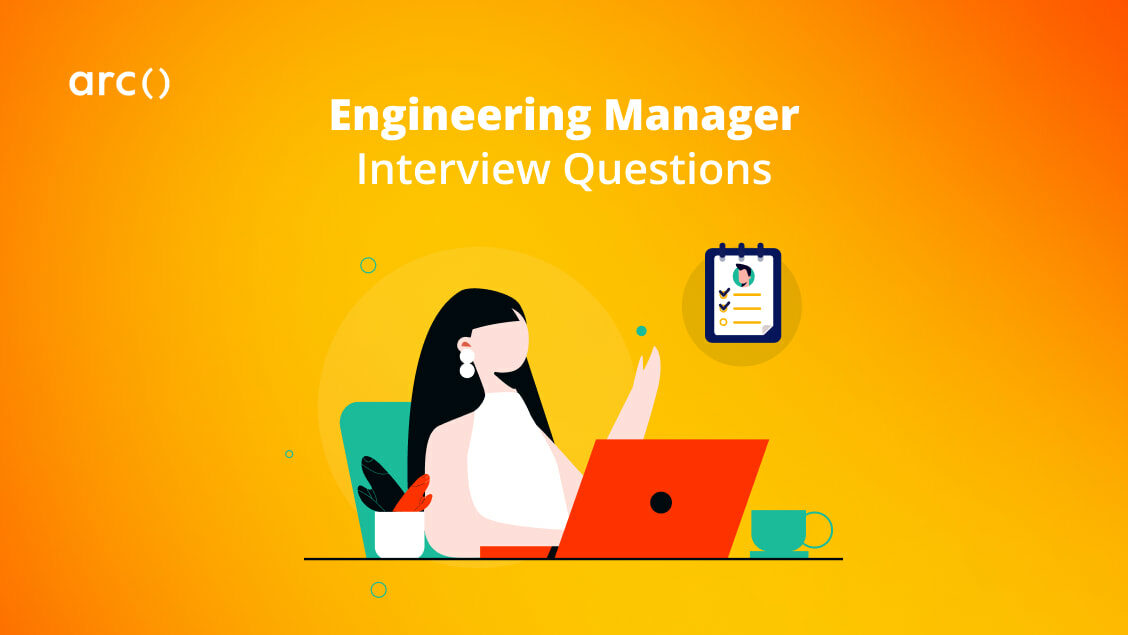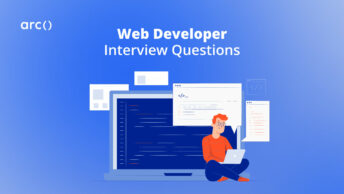Prioritization, mentoring, and risk management — a great engineering manager needs it all. How can you prove you’re the best candidate for the open position? For technical recruiters, how will you make sure you cover all the bases?
In this article, we are going to cover some critical questions often asked at interviews for engineering manager candidates. These questions not only help find candidates who best fit a company’s culture but also allow hiring managers to get a sense of candidates’ personal management styles.
By the end of the article, you’ll be familiar with the key attributes you should look for when hiring your next great engineering manager.
Looking to hire the best remote developers? Explore HireAI to see how you can:
⚡️ Get instant candidate matches without searching
⚡️ Identify top applicants from our network of 300,000+ devs with no manual screening
⚡️ Hire 4x faster with vetted candidates (qualified and interview-ready)
Try HireAI and hire top developers now →
1. How would you prioritize the following work?
One of the key responsibilities of an engineering manager is to prioritize and schedule the tasks needed to build a product or service. They must prioritize feature development, bug fixes, and refactoring technical debt or legacy code.
Good engineering managers know how to prioritize tasks based on how well they meet business objectives and based on the time, effort, and cost involved. Great engineering managers know how to ask the right questions to help with prioritization.
Ask this prioritization question with a list of 2-3 sample features, bug fixes, and other supporting tasks. It is also a good opening to lead into other questions.
Here is an example list of tasks:
- Build a new web app interface
- Upgrade the database
- Fix bug with concurrency in server code
- Fix JavaScript bug in front-end code
- Fix CSS display issue in front-end code
With this list, you can then ask the candidate “How would you prioritize those tasks?” The engineering manager candidate should ask probing questions about the background context of the tasks, the priorities of the team, and the organization.
They should ask about business goals and about the level of urgency of the tasks. For instance, fixing a bug with concurrency in the server code could be very important as it blocks the sales team from demoing the product to a client, or it could impact thousands of customers.
If an engineering manager job candidate does not ask too many probing questions, this could indicate a lack of experience. However, if instead of asking probing questions, they start to explain their choices, this could show confidence. It’s up to you how to interpret this during the interview.
2. You’re leading a team of three developers. How would you divide these tasks among them?
Good engineering managers know how to divide up tasks based on skill level and domain knowledge. Great engineering managers understand how to avoid overloading developers and how to spread knowledge throughout the organization.
This question invites the candidate to ask discerning questions to determine the optimal division of tasks. It is a good sign if they ask about the skill levels and domain knowledge of the team they will be leading. It is also a good sign if they try to pair developers or talk about work commonly done to accomplish those tasks. This provides the candidate with an opportunity to bring up their work experience in leading teams and give further information about their methodology.
3. In what ways have you upgraded the skills of your team?
Good engineering managers look for ways to train their team. _Great_ engineering managers look for ways to train their team in new skills so that new opportunities for the business can open.
This question gives you an indicator of whether the engineering manager candidate is a run-of-the-mill manager or a genuine leader. If they have had past experiences in providing their team with mentoring and coaching, they are more of a leader than a manager.
If the candidate tells you that they never had time to upgrade the skills of their team, this could be worrisome. An engineering manager should make room for their team to grow and learn new skills or improve their knowledge of programming languages, libraries, and frameworks.
4. Your project is running behind. How would you communicate this to other teams? How would you communicate this to the executive team?
In the software development industry, projects are always running behind in some fashion or another. With these questions, we are asking the engineering manager candidate to share how they would communicate project delays to team members and to their manager/executive team.
In a startup, the engineering manager could be responsible for two teams and have to communicate directly with both the CTO and the CEO.
Good engineering managers communicate in a collaborative manner. _Great_ engineering managers use collaboration to introduce post-mortems at the end of a sprint (or the end of the project).When answering this question, the candidate should mention that they listen to ideas from the team in these meetings to create action plans and minimize the risk of delays for future projects. _Great_ engineering managers create an environment where everyone is confident that everything is being done to complete the project and to get it back up to speed.
5. When working with product or project managers, have you disagreed with task prioritization? How did you resolve this?
Typically when an engineering manager is asked to give a high-level estimate for how long tasks will take, they should take into account whatever prioritization the product or project manager has in mind. They should then communicate this to their team, and assign appropriate resources (developers, DevOps, frontend engineers, machine learning engineers, etc.).
During the course of a project, however, there will be times when the prioritization of tasks needs to change, e.g. in response to:
- New bugs being discovered
- Users (or other stakeholders) giving feedback on features
- DevOps/server administration issues
The engineering manager candidate should be able to come up with prioritization examples from their past experiences in the industry. For example, their team could have been working on a few features when the sales team tried to bump up the priority of other features. How did the candidate manage to resolve the situation and communicate the consequences of changing task priority?
From here you can explore other questions about task prioritization and communication across the organization. For instance, let’s say the candidate has some job experience at a consultancy. You can ask if they’ve been exposed to a client trying to regularly shift priorities and disrupt the daily stand up into a sprint planning session.
In this case, how did the candidate manage the client’s expectations while protecting scrum processes? How did they communicate with the client? Did they push back and protect the team from changing priorities with good explanation or with good evidence? How did they communicate with their team about any re-prioritization? You can also explore how comfortable the candidate is with differing project timelines.
The goal of this question is to dig into the candidate’s past experience and understand their communication skills, including how they deal with challenges and obstacles. You also want to know how they handle constantly shifting priorities.
Check out our entire set of software development interview questions to help you hire the best developers you possibly can.
If you’re a developer, familiarize yourself with the non-technical interview questions commonly asked in the first round by HR recruiters and the questions to ask your interviewer!
Arc is the radically different remote job search platform for developers where companies apply to you. We’ll feature you to great global startups and tech companies hiring remotely so you can land a great remote job in 14 days. We make it easier than ever for software developers and engineers to find great remote jobs. Sign up today and get started.
6. In what ways do you support your team as they work on projects?
This question is used to explore the engineering manager candidate’s experience with mentoring, coaching, and otherwise generally supporting their team. For instance, the candidate may only have experience with getting projects done, and may not be familiar with accommodating the career aspirations of individuals on their team.
Or perhaps they are well-versed in coaching/mentoring and have set up consistent one-on-one meetings with all team members. This question will let you know if they are a good cultural fit, or if the candidate will have to adapt to the organization’s way of doing things.
You can also use this question to inquire about how previous teams responded to the support. These notes will be useful when it comes time to check the candidate’s references.
Additionally, this question can help you find out under what circumstances the candidate will jump in and develop code, whether it is to help mentor a junior developer or to ensure best practices are being followed when urgent situations arise.
Depending on your organization and the projects that you are working on, there will likely be an expectation that the candidate has coding experience and can actively code if need be.
7. How do you usually ensure a project runs on schedule?
With this engineering manager interview question, you can give the candidate an example scenario or probe into their experience at particular companies. You can ask “tell me about a time when your project was on schedule?” and “how did you help make that situation happen?”
You want to find out how the candidate could react to various obstacles and challenges, and how they conceptually see the software development process.
For instance, they could describe the process as a cone or funnel of uncertainty where a project’s scope and schedule become more certain and well-understood as the project moves along. Or they could think about software development and management as an exercise in risk reduction.
This question helps you find out how much the candidate knows, what style of management they engage in, and how well they prepare their team and projects for success.
8. Other Great Engineering Manager Interview Questions and Answers
The questions above are some of the most common, but here are a few other important interview questions to ask when interviewing engineering managers and senior developers:
- How do you incorporate team building into an engineering department?
- What do you do to grow as a leader, manager, and overall professional?
- How do you break down complex, technical topics to stakeholders who are not so technologically inclined?
- How do you view the engineering management role?
- What are some of your engineering management strengths?
- What are some of your engineering management weaknesses?
- How would you organize an engineering team that is distributed around the world and working remotely?
- How would you deal with a software developer under your management who continues to show bad performance?
- What is your process for ensuring coding accuracy?
- What are your top 5 software engineering tools?
- What, in your opinion, is the best programming language to work with?
- How hands-on do you prefer to be as an engineering manager?
- What do you do to encourage professional growth and continuous development on the teams you lead?
- What do you look for when hiring a new developer, QA analyst, or data engineer for your team?
Conclusion
Using the above interview questions for engineering manager candidates, you should be able to find out whether they will be a great fit in your organization. Will they work well with developers, product and project managers, and other teams? These are all crucial high-level questions you will seek to answer during engineering manager interviews.
The most important responsibilities of engineering managers are to ensure swift work delivery and good relations between teams/developers. With employers seeking to increase the retention of developers, one of many engineering managers’ emerging responsibilities now include mentoring and developing their team. Does this candidate have what it takes?
These interview questions should help you in finding not just a good engineering manager, but a great one — one who delivers and supports both their team and the organization.
You can also explore HireAI to skip the line and:
⚡️ Get instant candidate matches without searching
⚡️ Identify top applicants from our network of 250,000+ devs with no manual screening
⚡️ Hire 4x faster with vetted candidates (qualified and interview-ready)








